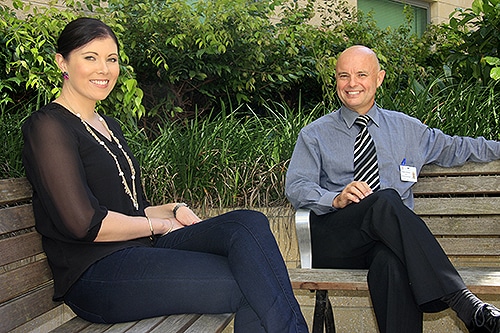
Just for a moment, put yourself in the shoes of Crystal Fitzgibbon who was just 26 when she suffered an acute stroke that paralysed her entire right side and literally rendered her speechless.
A landmark study by the HMRI Stroke Research Group has shown the ‘Lazarus-like’ benefits of a new clot-busting drug therapy.

A father’s touch …
It’s there at birth when a tiny hand clings to a burly thumb. It’s there when we first cross the road, warm and reassuring. It’s there to apply band-aids and to ruffle hair when a goal is scored.
Imagine, then, if it was suddenly taken away.
Just for a moment, put yourself in the shoes of Crystal Fitzgibbon who was just 26 when she suffered an acute stroke that paralysed her entire right side and literally rendered her speechless.
In the critical few hours that followed, Crystal recalls being taken to John Hunter Hospital, whisked through Emergency and thrust into the belly of a CT scanner in Radiology.
Life as she knew it hung in the balance. A future rich with promise was now in the hands of neurologist Dr Neil Spratt. But almost as swiftly as stroke had struck, a new drug restored normality.
Called Tenecteplase, it was being trialled against the standard clot-busting therapy Alteplase by the world-leading HMRI Stroke Research Group.
Within 24 hours Crystal achieved what doctors call the “Lazarus” effect, where she rose off her hospital bed. Three days later she was back home – speech, movement and vitality restored – and two years on, the attractive and articulate woman sipping a coffee shows no ill effects.
Crystal takes over the story:
“We’d just moved into our new home at Belmont and we were building a retaining wall. I put down one of those big blocks and suddenly didn’t feel 100 per cent.
“I sat down to compose myself and looked at my shorts. I noticed I had dribble on them. I then touched the right side of my mouth and realised I couldn’t feel it.
“I went inside to the bathroom and could see something wasn’t quite right. I tried to say hello to myself in the mirror but the word didn’t come out. I then tried to raise my right arm and it didn’t move.”
As Crystal staggered into the hallway her right leg gave way but fortunately her partner was there to catch her. He laid her on a lounge and called an ambulance.
“I had no feeling or movement and my face had dropped on the right side. They gave me the Tenecteplase and moved me to the acute stroke ward.
“I’m not sure how long it took but I remember my Dad standing next me, holding my right hand, and when the feeling came back there was no way in the world I was going to let his hand go.
“It was unbelievable …”
Crystal was one of 75 patients to pass the rigorous selection criterion used for the Tenecteplase trial. That’s out of almost 2,800 people who presented with stroke symptoms over a three-year period from 2008.
Findings just published in the prestigious New England Journal of Medicine show two-thirds of the patients treated with the Tenecteplase demonstrated major neurological improvement within a day, like Crystal, and 72 per cent experienced excellent or good recovery three months after their stroke.
Of those administered Alteplase, 36 per cent showed improvement at 24 hours and 44 per cent had good or excellent recovery after 90 days.
“These results took us by surprise,” study leader Mark Parsons from the University of Newcastle and Staff Specialist in Neurology at John Hunter Hospital said. “With Alteplase we have seen a few dramatic outcomes but using a higher dosage of Tenecteplase there were some ‘Lazarus-like’ responses where the patient almost rose off the bed in a miraculous recovery.”
Stroke researcher Professor Chris Levi said that Tenecteplase was highly effective as part of a tailored treatment.
“Not all stroke patients benefit from clot-busting drugs but because stroke is such a hard illness to treat, any advance in treatment methods is like gold,” he said.
For Crystal, going home was joyous yet surreal. She realised how close she came to being in hospital for far longer than three days.
“I was thankful I had the stroke where and when I did. Without this drug I doubt I’d be sitting here speaking with you today. It has given me a second chance for sure.
“My future is whatever I want it to be. I’m back at work full time, I’m studying law part time, I’m planning a wedding …” She pauses, wrought with emotion. “Yes, it’s unlimited.”
HMRI would like to acknowledge the Traditional Custodians of the land on which we work and live, the Awabakal and Worimi peoples, and pay our respects to Elders past and present. We recognise and respect their cultural heritage and beliefs and their continued connection to their land.

Hunter Medical Research Institute
We’re taking healthy further.
Locked Bag 1000
New Lambton
NSW, Australia, 2305



This site is protected by reCAPTCHA and the Google Privacy Policy and Terms of Service apply.
Copyright © 2024 Hunter Medical Research Institute | ABN: 27 081 436 919
Site by Marlin Communications
